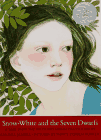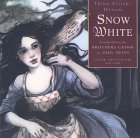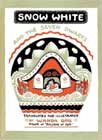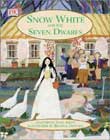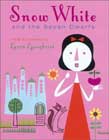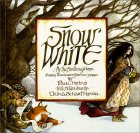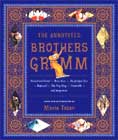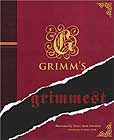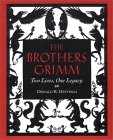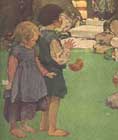
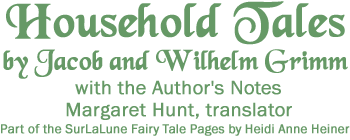
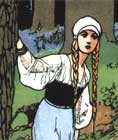
Author's Notes
translated by Margaret Hunt
Return
to
Household Tales:
Table of Contents
Previous
Tale:
King Thrushbeard
Next
Tale:
The Knapsack, the Hat, and the Horn
SurLaLune Fairy Tales Main Page
Little Snow-White
Don't
miss SurLaLune's annotated version of the tale at:
Snow White and the Seven Dwarfs
ONCE upon a time in the middle of
winter, when the flakes of snow were falling like feathers from the sky,
a queen sat at a window sewing, and the frame of the window was made of
black ebony. And whilst she was sewing and looking out of the window at
the snow, she pricked her finger with the needle, and three drops of blood
fell upon the snow. And the red looked pretty upon the white snow, and
she thought to herself, "Would that I had a child as white as snow,
as red as blood, and as black as the wood of the window-frame."
Soon after that she had a little daughter, who was as white as snow, and as red as blood, and her hair was as black as ebony; and she was therefore called Little Snow-white. And when the child was born, the Queen died.
After a year had passed the King took to himself another wife. She was a beautiful woman, but proud and haughty, and she could not bear that anyone else should surpass her in beauty. She had a wonderful looking-glass, and when she stood in front of it and looked at herself in it, and said --
"Looking-glass, Looking-glass, on the wall,
Who in this land is the fairest of all?"
the looking-glass answered --
"Thou, O Queen, art the fairest of all!"
Then she was satisfied, for she knew that the looking-glass
spoke the truth.
But Snow-white was growing up, and grew more and more beautiful; and when she was seven years old she was as beautiful as the day, and more beautiful than the Queen herself. And once when the Queen asked her looking-glass --
"Looking-glass, Looking-glass, on the wall,
Who in this land is the fairest of all?"
it answered --
"Thou art fairer than all who are here, Lady Queen.
But more beautiful still is Snow-white, as I ween."
Then the Queen was shocked, and turned yellow and green
with envy. From that hour, whenever she looked at Snow-white, her heart
heaved in her breast, she hated the girl so much.
And envy and pride grew higher and higher in her heart like a weed, so
that she had no peace day or night. She called a huntsman, and said, "Take
the child away into the forest; I will no longer have her in my sight.
Kill her, and bring me back her heart as a token." The huntsman obeyed,
and took her away; but when he had drawn his knife, and was about to pierce
Snow-white's innocent heart, she began to weep, and said, "Ah dear
huntsman, leave me my life! I will run away into the wild forest, and
never come home again."
And as she was so beautiful the huntsman had pity on her and said, "Run away, then, you poor child." "The wild beasts will soon have devoured you," thought he, and yet it seemed as if a stone had been rolled from his heart since it was no longer needful for him to kill her. And as a young boar just then came running by he stabbed it, and cut out its heart and took it to the Queen as proof that the child was dead. The cook had to salt this, and the wicked Queen ate it, and thought she had eaten the heart of Snow-white.
But now the poor child was all alone in the great forest, and so terrified that she looked at every leaf of every tree, and did not know what to do. Then she began to run, and ran over sharp stones and through thorns, and the wild beasts ran past her, but did her no harm.
She ran as long as her feet would go until it was almost evening; then she saw a little cottage and went into it to rest herself. Everything in the cottage was small, but neater and cleaner than can be told. There was a table on which was a white cover, and seven little plates, and on each plate a little spoon; moreover, there were seven little knives and forks, and seven little mugs. Against the wall stood seven little beds side by side, and covered with snow-white counterpanes.
Little Snow-white was so hungry and thirsty that she ate some vegetables and bread from each plate and drank a drop of wine out of each mug, for she did not wish to take all from one only. Then, as she was so tired, she laid herself down on one of the little beds, but none of them suited her; one was too long, another too short, but at last she found that the seventh one was right, and so she remained in it, said a prayer and went to sleep.
When it was quite dark the owners of the cottage came back; they were seven dwarfs who dug and delved in the mountains for ore. They lit their seven candles, and as it was now light within the cottage they saw that someone had been there, for everything was not in the same order in which they had left it.
The first said, "Who has been sitting on my chair?"
The second, "Who has been eating off my plate?"
The third, "Who has been taking some of my bread?"
The fourth, "Who has been eating my vegetables?"
The fifth, "Who has been using my fork?"
The sixth, "Who has been cutting with my knife?"
The seventh, "Who has been drinking out of my mug?"
Then the first looked round and saw that there was a little hole on his bed, and he said, "Who has been getting into my bed?" The others came up and each called out, "Somebody has been lying in my bed too." But the seventh when he looked at his bed saw little Snow-white, who was lying asleep therein. And he called the others, who came running up, and they cried out with astonishment, and brought their seven little candles and let the light fall on little Snow-white. "Oh, heavens! oh, heavens!" cried they, "what a lovely child!" and they were so glad that they did not wake her up, but let her sleep on in the bed. And the seventh dwarf slept with his companions, one hour with each, and so got through the night.
When it was morning little Snow-white awoke, and was frightened when she saw the seven dwarfs. But they were friendly and asked her what her name was. "My name is Snow-white," she answered. "How have you come to our house?" said the dwarfs. Then she told them that her step-mother had wished to have her killed, but that the huntsman had spared her life, and that she had run for the whole day, until at last she had found their dwelling. The dwarfs said, "If you will take care of our house, cook, make the beds, wash, sew, and knit, and if you will keep everything neat and clean, you can stay with us and you shall want for nothing." "Yes," said Snow-white, "with all my heart," and she stayed with them. She kept the house in order for them; in the mornings they went to the mountains and looked for copper and gold, in the evenings they came back, and then their supper had to be ready. The girl was alone the whole day, so the good dwarfs warned her and said, "Beware of your step-mother, she will soon know that you are here; be sure to let no one come in."
But the Queen, believing that she had eaten Snow-white's heart, could not but think that she was again the first and most beautiful of all; and she went to her looking-glass and said --
"Looking-glass, Looking-glass, on the wall,
Who in this land is the fairest of all?"
and the glass answered --
"Oh, Queen, thou art fairest of all I see,
But over the hills, where the seven dwarfs dwell,
Snow-white is still alive and well,
And none is so fair as she."
Then she was astounded, for she knew that the looking-glass
never spoke falsely, and she knew that the huntsman had betrayed her,
and that little Snow-white was still alive.
And so she thought and thought again how she might kill her, for so long
as she was not the fairest in the whole land, envy let her have no rest.
And when she had at last thought of something to do, she painted her face,
and dressed herself like an old pedler-woman, and no one could have known
her. In this disguise she went over the seven mountains to the seven dwarfs,
and knocked at the door and cried, "Pretty things to sell, very cheap,
very cheap." Little Snow-white looked out of the window and called
out, "Good-day my good woman, what have you to sell?" "Good
things, pretty things," she answered; "stay-laces of all colours,"
and she pulled out one which was woven of bright-coloured silk. "I
may let the worthy old woman in," thought Snow-white, and she unbolted
the door and bought the pretty laces. "Child," said the old
woman, "what a fright you look; come, I will lace you properly for
once." Snow-white had no suspicion, but stood before her, and let
herself be laced with the new laces. But the old woman laced so quickly
and so tightly that Snow-white lost her breath and fell down as if dead.
"Now I am the most beautiful," said the Queen to herself, and
ran away.
Not long afterwards, in the evening, the seven dwarfs came home, but how shocked they were when they saw their dear little Snow-white lying on the ground, and that she neither stirred nor moved, and seemed to be dead. They lifted her up, and, as they saw that she was laced too tightly, they cut the laces; then she began to breathe a little, and after a while came to life again. When the dwarfs heard what had happened they said, "The old pedler-woman was no one else than the wicked Queen; take care and let no one come in when we are not with you."
But the wicked woman when she had reached home went in front of the glass and asked --
"Looking-glass, Looking-glass, on the wall,
Who in this land is the fairest of all?"
and it answered as before --
"Oh, Queen, thou art fairest of all I see,
But over the hills, where the seven dwarfs dwell,
Snow-white is still alive and well,
And none is so fair as she."
When she heard that, all her blood rushed to her heart
with fear, for she saw plainly that little Snow-white was again alive.
"But now," she said, "I will think of something that shall
put an end to you," and by the help of witchcraft, which she understood,
she made a poisonous comb. Then she disguised herself and took the shape
of another old woman. So she went over the seven mountains to the seven
dwarfs, knocked at the door, and cried, "Good things to sell, cheap,
cheap!" Little Snow-white looked out and said, "Go away; I cannot
let any one come in." "I suppose you can look," said the
old woman, and pulled the poisonous comb out and held it up. It pleased
the girl so well that she let herself be beguiled, and opened the door.
When they had made a bargain the old woman said, "Now I will comb
you properly for once." Poor little Snow-white had no suspicion,
and let the old woman do as she pleased, but hardly had she put the comb
in her hair than the poison in it took effect, and the girl fell down
senseless. "You paragon of beauty," said the wicked woman, "you
are done for now," and she went away.
But fortunately it was almost evening, when the seven dwarfs came home. When they saw Snow-white lying as if dead upon the ground they at once suspected the step-mother, and they looked and found the poisoned comb. Scarcely had they taken it out when Snow-white came to herself, and told them what had happened. Then they warned her once more to be upon her guard and to open the door to no one.
The Queen, at home, went in front of the glass and said --
"Looking-glass, Looking-glass, on the wall,
Who in this land is the fairest of all?"
then it answered as before --
"Oh, Queen, thou art fairest of all I see,
But over the hills, where the seven dwarfs dwell,
Snow-white is still alive and well,
And none is so fair as she."
When she heard the glass speak thus she trembled and shook
with rage. "Snow-white shall die," she cried, "even if
it costs me my life!"
Thereupon she went into a quite secret, lonely room, where no one ever came, and there she made a very poisonous apple. Outside it looked pretty, white with a red cheek, so that everyone who saw it longed for it; but whoever ate a piece of it must surely die.
When the apple was ready she painted her face, and dressed herself up as a country-woman, and so she went over the seven mountains to the seven dwarfs. She knocked at the door. Snow-white put her head out of the window and said, "I cannot let any one in; the seven dwarfs have forbidden me." "It is all the same to me," answered the woman, "I shall soon get rid of my apples. There, I will give you one."
"No," said Snow-white, "I dare not take anything." "Are you afraid of poison?" said the old woman; "look, I will cut the apple in two pieces; you eat the red cheek, and I will eat the white." The apple was so cunningly made that only the red cheek was poisoned. Snow-white longed for the fine apple, and when she saw that the woman ate part of it she could resist no longer, and stretched out her hand and took the poisonous half. But hardly had she a bit of it in her mouth than she fell down dead. Then the Queen looked at her with a dreadful look, and laughed aloud and said, "White as snow, red as blood, black as ebony-wood! this time the dwarfs cannot wake you up again."
And when she asked of the Looking-glass at home --
"Looking-glass, Looking-glass, on the wall,
Who in this land is the fairest of all?"
it answered at last --
"Oh, Queen, in this land thou art fairest of all."
Then her envious heart had rest, so far as an envious
heart can have rest.
The dwarfs, when they came home in the evening, found Snow-white lying upon the ground; she breathed no longer and was dead. They lifted her up, looked to see whether they could find anything poisonous, unlaced her, combed her hair, washed her with water and wine, but it was all of no use; the poor child was dead, and remained dead. They laid her upon a bier, and all seven of them sat round it and wept for her, and wept three days long.
Then they were going to bury her, but she still looked as if she were living, and still had her pretty red cheeks. They said, "We could not bury her in the dark ground," and they had a transparent coffin of glass made, so that she could be seen from all sides, and they laid her in it, and wrote her name upon it in golden letters, and that she was a king's daughter. Then they put the coffin out upon the mountain, and one of them always stayed by it and watched it. And birds came too, and wept for Snow-white; first an owl, then a raven, and last a dove.
And now Snow-white lay a long, long time in the coffin, and she did not change, but looked as if she were asleep; for she was as white as snow, as red as blood, and her hair was as black as ebony.
It happened, however, that a king's son came into the forest, and went to the dwarfs' house to spend the night. He saw the coffin on the mountain, and the beautiful Snow-white within it, and read what was written upon it in golden letters. Then he said to the dwarfs, "Let me have the coffin, I will give you whatever you want for it." But the dwarfs answered, "We will not part with it for all the gold in the world." Then he said, "Let me have it as a gift, for I cannot live without seeing Snow-white. I will honour and prize her as my dearest possession." As he spoke in this way the good dwarfs took pity upon him, and gave him the coffin.
And now the King's son had it carried away by his servants on their shoulders. And it happened that they stumbled over a tree-stump, and with the shock the poisonous piece of apple which Snow-white had bitten off came out of her throat. And before long she opened her eyes, lifted up the lid of the coffin, sat up, and was once more alive. "Oh, heavens, where am I?" she cried. The King's son, full of joy, said, "You are with me," and told her what had happened, and said, "I love you more than everything in the world; come with me to my father's palace, you shall be my wife."
And Snow-white was willing, and went with him, and their wedding was held with great show and splendour. But Snow-white's wicked step-mother was also bidden to the feast. When she had arrayed herself in beautiful clothes she went before the Looking-glass, and said --
"Looking-glass, Looking-glass, on the wall,
Who in this land is the fairest of all?"
the glass answered --
"Oh, Queen, of all here the fairest art thou,
But the young Queen is fairer by far as I trow."
Then the wicked woman uttered a curse, and was so wretched,
so utterly wretched, that she knew not what to do. At first she would
not go to the wedding at all, but she had no peace, and must go to see
the young Queen. And when she went in she knew Snow-white; and she stood
still with rage and fear, and could not stir. But iron slippers had already
been put upon the fire, and they were brought in with tongs, and set before
her. Then she was forced to put on the red-hot shoes, and dance until
she dropped down dead.
Next
Tale:
The Knapsack, the Hat, and the Horn
Grimm, Jacob and Wilhelm. Household Tales. Margaret Hunt, translator. London: George Bell, 1884, 1892. 2 volumes.
Notes
From various stories from Hesse, where this story is one of the best known of all, yet even in that district, where High German especially prevails, the Low German name of Sneewitchen is retained, or even corrupted into Schliwitchen. In the opening it is like the story of the Juniper-tree; and it is still more like it in another story where the Queen, whilst driving with the King in the sledge, peels an apple, and cuts her finger while doing it. Another beginning of the story is this. A Count and Countess were driving past three heaps of white snow, and the Count said," How I wish I had a girl as white as this snow! "Soon they came to three pits filled with red blood, and again he spoke, and said, "I wish I had a girl with cheeks as red as this blood." Finally, three black ravens flew by, and he wished for "a girl with hair as black as those ravens." When they had driven a little farther they met a girl white as snow, red as blood, and with hair as black as the ravens, and this was Snow-white. The Count at once made her come into the carriage and loved her, but the Countess did not, and thought of nothing but how to get rid of her. At last she let her glove fall out and commanded Snow-white to find it again, but in the meantime made the coachman drive quickly away. And now Snow-white was alone and came to the dwarfs, &c. In a third story the only variation is that the Queen drives with Snow- white into the forest, and asks her to gather a nosegay of the beautiful roses there, and while she is doing it, drives away and leaves her alone. In a fourth, it is narrated that after Snow- white's death she is to he burnt by the dwarfs. They wrap her in a sheet, make a pile of wood under a tree, and suspend her over it by cords. Just as they are going to light the fire, the Prince comes, who has her taken down, and carries her away with him in his carriage. The motion of the carriage makes the bit of poisoned apple jump out of her throat and she comes to life. A fifth story has the following variations. A certain King loses his wife, by whom he has an only daughter, named Snow- white, and he takes another by whom he has three daughters. She, too, hates her step-child because of her wondrous beauty, and ill-treats her whenever she can. In a cave in the forest dwell seven dwarfs who kill every maiden who approaches them. The Queen knows this, and as she does not wish to kill Snow-white by direct means, she hopes to get rid of her by taking her to the entrance of their cave, and saying, "Go in there, and wait till I come back." Then she goes away and Snow-white fearlessly enters the cave. The dwarfs come and at first want to kill her, but as she is so beautiful, they let her live, and tell her that in return for this, she must keep house for them. Snow-white, however, has a dog called "Mirror," and now she is gone, it stays in the castle, and is full of grief. The Queen asks it,
"Mirror, mirror beneath the bench,
Look in this land, look in that land,
Who is the fairest in Engelland?"
The dog answers, "Snow-white with her seven dwarfs is much more beautiful than my lady Queen with her three daughters." Thus she becomes aware that Snow-white is still living, and makes a poisoned stay-lace. With this she goes to the cave and calls to Snow-white that she is to open the door to her. Snow-white will not do it, because the seven dwarfs have strictly forbidden her to let in any human being, and certainly not the stepmother, who has tried to destroy her. The Queen however tells Snow-white that she has no daughters now, for a knight has robbed her of them, and that she would like to live with her and dress her prettily. Snow-white pities her and lets her in, and then the Queen laces her with the poisoned stay-lace, and she falls down dead, whereupon the Queen goes away. But the seven dwarfs come and take a knife and cut the stay-lace in two, and Snow-white returns to life again. And now the Queen questions Mirror (the dog) under the bench, and it gives her the same answer. Then she makes a poisoned hair-ribbon, and goes with it, and speaks so movingly to Snow-white, that she again lets her in. The Queen binds the ribbon round Snow-white's hair, and she falls down dead. But the seven dwarfs see what has happened, cut off the hair-ribbon, and she is restored to life. The Queen questions the dog the third time, and receives the same answer. And now she goes with a poisoned apple, and in spite of all the warnings which Snow-white has had from the dwarfs, she is touched by her lamentations, opens the door, and eats some of the apple. Then she dies, and when the dwarfs come they can do nothing for her, and" Mirror," under the bench, tells the Queen that she is now the most beautiful. But the seven dwarfs make a silver coffin, put Snow-white into it, and place it on a tree in front of their cave. A Prince comes by, and asks the dwarfs to give him the coffin, and takes it with him, and when he gets home has her laid upon a bed and dressed as if she were alive, and loves her above measure. A servant has to wait on her continually; but one day he gets angry at having do to this, and says, "The dead maiden is just to be treated as if she were a living one," and gives her a blow on her back, on which the piece of apple comes out of her mouth, and Snow-white is once more alive. A Viennese version of this story gives the following incidents. There are three sisters; Snow-white is the prettiest and youngest. The other two hate her, and send her out into the world with a loaf of bread and a pitcher of water. Snow-white comes to the glass mountain, and keeps house for the dwarfs. And now, when the two sisters ask the mirror who is the fairest, it answers,
"The fairest is on the Glass mountain,
And she dwells with the little dwarfs."
They send some one thither to poison Snow-white. See Richilda in Musaus, where the rhyme runs thus:
"Mirror white, mirror bright,
Mirror, let me have a sight,
Of the fairest girl in Brabant!"
It is also a genuine incident that, in the end, the dwarfs make steel slippers, heat them till they are red-hot, and put them on the feet of the stepmother, who is forced to dance in them until the floor smokes. In Wallachian, see The Magic Mirror, Schott, No.6. In the Pentamerone, the Kitchen-maid (2. 8).
There is a remarkable unison between this story and a Norse one, which has already become almost an historical saga. Snafridr, a most beautiful woman (qvenna friduzt), wife of Herald Harfager, dies, "and her countenance was not in the slightest degree altered, but she was just as rosy as if still in life. The King sat by the corpse and thought she would return to life, and thus he sat for three years." (Haraldssaga, chap. 25; Heimskringla, 1. 102). For the drops of blood upon the snow, compare the preface to Liebrecht's Translation of the Pentamerone, xxi. xxiii. The punishment of having to dance till dead occurs also in a Danish popular saga (Thiele, 1. 130), and the seven gold mountains in a Swedish popular song, in Geyer, 3, 72, 74; and in Firdusi (Görres, 1.180), there is "on seven mountains must thou alight, where crowds upon crowds of frightful Deevs meet thee."
©Heidi
Anne Heiner, SurLaLune Fairy Tales
E-mail: surlalune@aol.com
Page last updated October 15, 2006
www.surlalunefairytales.com

